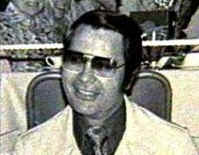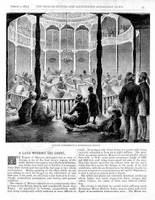
In other parts of Spain, they eat a dozen grapes as soon the clock strikes twelve. A well-placed joke immediately afterwards produces amusing results. A similar custom comes from Colombia. Burning "Mr. Old Year" is a New Year's tradition. The whole family takes part. Here, the celebration is more chauvinistic. The doll is a male and it’s stuffed with different things, sometimes with fireworks to heighten the excitement. Also, they put in objects representing sadness and failure (love letters to to an estranged lover, notices of employment termination, etc), objects that can bring sadness or bad memories. These things burn with the old year. The effigy is dressed in unwanted clothes from each member of the family. At midnight, the doll is lit. It becomes a symbol of burning the past and starting the new year on a new slate.
In some US states the new year is celebrated by eating black-eyed peas, often together with hog jowls or ham. The hog is considered lucky because it symbolizes prosperity. Cabbage is another "good luck" vegetable that is consumed on New Year's Day by many. Cabbage leaves are also considered a sign of prosperity, being representative of paper currency. In some countries, rice is a lucky food that is eaten on New Year's. In Sweden, pork and cabbage is a traditional Christmas repast, thus jumping the gun by a week.
New Year’s resolutions seem to be a world wide tradition. And breaking them the day after, too. But it’s not the resolution that’s important, but rather the making of it. It makes us feel good. We feel in control of our lives and our future. We have the power to direct our ambitions, our lusts, our desires, our cravings, our weaknesses and our prior failures.
The rest of the year
Superstition is something that seems to completely inundate our daily lives in the Western world. Playing on the state lottery, knocking on wood, crossing our fingers, feeling eerie during a late evening’s walk near a churchyard, throwing salt over our left shoulder (or is it the right?), visiting a ghost’s sumptuous residence in the local castle, checking out the latest horrorscope in this week’s women’s mag and of course our new year's resolutions. Why do we do it?
In tune with an increasing de-Christanisation (i.e. de-Catholisation) of our post-modern society, we are forced to replace the symbols, signs and rites of our spiritual heritage with shallow substitutes containing little real association with the living of our daily lives. And in concert with the various superstitions we surround ourselves with, we try to put them in some sort of semblance. According to a Harris Poll© in 2001, 89% believe in miracles, 68% in the devil, 69% in hell, 51% in ghosts, 31% in astrology and 27% in reincarnation. What we see is that about two-thirds of all adults believe in hell and the devil, but hardly anybody expects that they will go to hell themselves.
Well-educated and intellectually sharp and cutting-edge academicians see no rational risks in perusing the weekly – or for that matter, daily - horoscopes in their local tabloid or women’s magazine. Why it is mainly women who lend themselves to this transcendental gobbledygook is one of the great mysteries of our gender-free oriented society.

Historical background
Belief in spirits was (and is) a natural result of a politically-oriented Church organisation. Ghosts were the visually disembodied souls of a dead person, i.e. former mortals in Purgatory, striving for a last chance for Paradise. With the coming of the Reformation, spirits, ghosts and saints, able to intervene in our daily and mundane lives, were discouraged. Even folklore, with its elves, pixies and gremlins were banned, officially relegated to the quagmire of pontifical ostentation.
But with the advent of Romanticism in literature, music and art, ghosts became – once again – up to standard, and the Church had to adapt. Gothic cathedrals were built, folklore was tolerated and areligious ghosts entered the realm of high culture. People had a need for quasi-spiritual answers to the deeply and genuinely spiritual questions of life.
With the modern era, and the decline of institutionalized religion, the need for pseudo-spirituality has grown and become satisfied by more innovative and anti-intellectual solutions: New Age, holistic medicine, astrology, scientology, magnetic healing and suicidal sects where Jim Jones’ People’s Temple is perhaps the foremost example.

What it boils down to is this: man has always had a need for spirituality, for answers to the unsolved questions of our existence. At times, this need is channeled via an established religious organisation, denomination or institution and thusly (ad)ministered therewithal. In other situations and times, this need is met by means of self-administered panaceas such as the weekly horoscopes in the popular press.
But why do we need this, century after century? And how did a fully dressed effigy get relegated to a simple pair of crimson thongs? It will have to be a subject for a later blog entry, I suppose.










.2.jpg)


